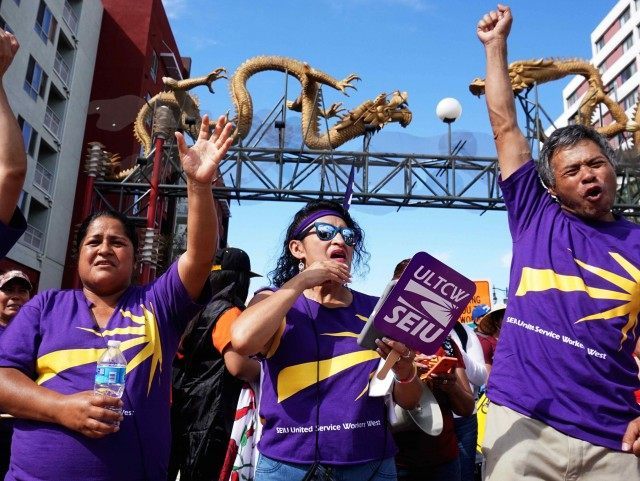Turmoil is rising between divisions of the powerful Service Employees International Union (SEIU) labor union over circumventing failed legislative efforts and attempting to use ballot measures to raise California’s minimum wage to $15 per hour.
The SEIU state council supports a ballot measure unveiled Tuesday that would force the minimum wage to $15 an hour by 2020, according to the Sacramento Bee. The measure would also mandate six paid sick days a year.
A separate effort being put forth by SEIU-United Healthcare Workers West would still mandate increases, but at a slightly reduced rate. The $15 rate would hit California just a year later, in 2021, and would mandate three sick days instead of the six in the other proposal. The Bee reported that the SEIU-UHW effort received support from 2018 gubernatorial candidate Lt. Gov. Gavin Newsom the day of the plan’s unveiling.
Newsom was quoted in the Bee as saying “it’s only appropriate that [California] lead on addressing income inequality.”
Under the current statewide rate increase schedule, the $9 an hour minimum wage will jump to $10 this coming January. Breitbart News reported in August on a National Federation of Independent Business (NFIB) California chapter estimate that the jump will cost the state economy $5.7 billion and 68,000 jobs over the next decade.
An Emeryville, California pizza shop voluntarily raised minimum wage rates to $15-25 an hour for employees, compensating by raising prices and doing away with tips. As Breitbart News reported, the shop advertised “sustainable” $30 pizzas. Within a few months shop sales dropped 25 per cent and the owner feared closing his 18-year-old business.
In January 2014 SeaTac, Washington became the first region in the nation to adopt a $15 minimum wage. Assunta Ng of Northwest Asian Weekly reported just months later on conversations she had with area minimum wage workers under the new rate. She highlighted worker accounts of lost benefits, increased costs, and unequal treatment between union and non-union workers.
Follow Michelle Moons on Twitter @MichelleDiana

COMMENTS
Please let us know if you're having issues with commenting.